Batteries
SK On, BASF tie up for EV battery materials business
LG Energy, SK On cut factory runs in Q3 on slowing EV demand; Korean cell makers aim to improve long-term competitiveness
By Nov 15, 2023 (Gmt+09:00)
4
Min read
Most Read
LG Chem to sell water filter business to Glenwood PE for $692 million


Kyobo Life poised to buy Japan’s SBI Group-owned savings bank


KT&G eyes overseas M&A after rejecting activist fund's offer


StockX in merger talks with Naver’s online reseller Kream


Mirae Asset to be named Korea Post’s core real estate fund operator



SK On Co., the world’s fifth-largest electric vehicle battery maker, and BASF SE, a major global cell materials producer, joined forces for the cell ingredient sector in North America and the Asia-Pacific to improve long-term competitiveness amid slowing growth in the eco-friendly automobile industry.
SK On and BASF said on Wednesday that they agreed to jointly evaluate collaboration opportunities in the global lithium-ion battery market. The two companies are set to develop industry-leading battery materials for lithium-ion batteries.
They plan to focus on evaluating collaboration options for cathode active materials (CAM) production while expanding their cooperation to the overall battery value chain, including recycling.
“With the collaboration with SK On, we are further strengthening our market position to serve battery manufacturers and electric vehicle producers around the world,” said Peter Schuhmacher, BASF’s president of the catalyst division, who is also responsible for the company’s battery materials and battery recycling business. “We want to address the need for more sustainable solutions for the electric vehicle industry.”
The German chemical producer is supplying advanced CAM for lithium-ion batteries to global cell manufacturers and striving to provide solutions for key metal sourcing and waste battery recycling.
SLOWING EV GROWTH
The cooperation came as global EV and battery makers are struggling to cope with slowing growth in the clean vehicle industry.
Battery makers, which had expanded capacities with aggressive investments, cut production amid increasing EV inventories on weakening demand. The battery cell industry is expected to keep reducing output for the time being as automakers are slowing EV production and investments, industry sources said.
SK On and LG Energy Solution Ltd., the world’s No. 2 EV cell maker, already lowered runs of their global battery plants in the third quarter.
SK On cut its average operating rate to 94.9% in the third quarter from 95.4% in the second, according to its quarterly earnings statement.
LG Energy’s utilization rates of its world’s factories in the first three quarters of the year averaged at 72.9%, 2.5 percentage points lower than a year earlier, its quarterly earnings report showed. Its average global run has been falling since its peak of 77.7% in the first quarter. The battery supplier of major EV makers, including Tesla Inc., General Motors Co., Ford Motor Co. and Volkswagen, slashed output as demand for the clean vehicle slowed, increasing inventories.
LG ENERGY CUTS RUN OF POLAND FACTORY
LG Energy reduced runs of its Poland factory, the world’s largest battery production facility, from around the beginning of the second half as Volkswagen cut EV output. The plant is for Europe, the world’s third-largest market of the eco-friendly vehicles.
“We flexibly adjusted output in line with customers’ situations,” said an official of the leading South Korean battery maker.
The inventories of the Volkswagen ID. series quadrupled to about 4,000 units a month on average in the January-September period from two years ago, according to MarkLines Co., an automotive industry portal.
The outlook for the US, the world’s No. 2 EV market, is also bearish. The average EV sold after 80 days on a dealer’s lot in September, more than double 36 days early this year, showed data from Cloud Theory, a market analysis firm based on artificial intelligence. US carmakers such as GM and Ford decided to delay the production of new EVs, which they had originally planned to launch this year, and new investments.
Such a slowdown prompted LG Energy and SK On cut jobs and outputs at their US plants. Samsung SDI Co., the world’s sixth-largest battery maker, is keeping an eye on its customers, although the South Korean company has been maintaining its operating rates so far this year at levels in 2022.
CARMAKERS DELAY BATTERY PURCHASES
Sliding battery prices in line with lower raw materials costs caused automakers to postpone cell procurements.
“Carmakers looked to adjust orders, waiting for further slides in battery prices, as costs for minerals such as lithium and nickel slumped,” said Chung Won-suk, an analyst at HI Investment & Securities in Seoul.
Goldman Sachs said EV battery prices are falling faster than expected in a research note on Nov. 1. The leading global financial group said battery prices are expected to fall to $99 per kilowatt hour of storage capacity by 2025 – a 40% decrease from 2022, compared with its previous forecast of a 33% slide.
LG Energy, SK On and Samsung SDI plan to improve their own competitiveness during the industry slump.
SK On joined hands with BASF to enhance the overall supply chain for the goal.
“The collaboration with BASF is part of our efforts to bolster the battery materials supply chain,” said SK On CEO Jee Dong-seob.

Samsung SDI is set to increase production of cathodes with its subsidiary STM Co. investing 412.5 billion won ($316.7 million) in new production lines for the battery material.
“Samsung SDI aims to reduce the dependence on EcoPro BM by increasing its own production,” said an industry source in Seoul. The battery maker is the top customer of EcoPro BM Co., South Korea’s largest cathode supplier.
Write to Nan-Sae Bin and Sungsu Bae at binthere@hankyung.com
Jongwoo Cheon edited this article.
More to Read
-

-
 BatteriesLG Energy, Ford’s battery JV in Turkey scrapped as EV uptake slows
BatteriesLG Energy, Ford’s battery JV in Turkey scrapped as EV uptake slowsNov 12, 2023 (Gmt+09:00)
3 Min read -
 BatteriesLG Energy, SK On to delay battery JVs with Ford as demand slows
BatteriesLG Energy, SK On to delay battery JVs with Ford as demand slowsNov 07, 2023 (Gmt+09:00)
4 Min read -
 BatteriesBattery cell prices plummet amid supply glut in China, weak EV demand
BatteriesBattery cell prices plummet amid supply glut in China, weak EV demandSep 15, 2023 (Gmt+09:00)
2 Min read -
 BatteriesFalling mineral prices to hit Korean battery materials makers
BatteriesFalling mineral prices to hit Korean battery materials makersAug 14, 2023 (Gmt+09:00)
2 Min read -
 BatteriesEcoPro’s cathode material sales to Samsung more than treble
BatteriesEcoPro’s cathode material sales to Samsung more than trebleMar 29, 2023 (Gmt+09:00)
1 Min read
Comment 0
LOG IN


